 Wireshark is a network protocol analyzer. It allows to inspect network traffic or capture it for offline analysis. It allows to deeply analyze protocols, provides a three pane package browser or a console tool. It can filter and colorize according to complex and custom rule sets. It also allows VoIP analysis, and understands a plethora of capture and compression formats. Live data can be read from Ethernet, IEEE 802.11, PPP/HDLC, ATM, Bluetooth, USB, Token Ring, Frame Relay, FDDI, and others net
Wireshark is a network protocol analyzer. It allows to inspect network traffic or capture it for offline analysis. It allows to deeply analyze protocols, provides a three pane package browser or a console tool. It can filter and colorize according to complex and custom rule sets. It also allows VoIP analysis, and understands a plethora of capture and compression formats. Live data can be read from Ethernet, IEEE 802.11, PPP/HDLC, ATM, Bluetooth, USB, Token Ring, Frame Relay, FDDI, and others net
 SVR.JS is a web server running on Node.JS, that's free as in freedom, scalable, secure, and configurable.
SVR.JS is a web server running on Node.JS, that's free as in freedom, scalable, secure, and configurable.
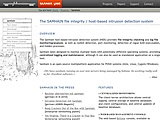 Samhain is a file integrity / intrusion detection system that can be used on single hosts as well as on networks. It been designed to monitor multiple hosts with potentially different operating systems, providing centralized logging and baseline database storage, although it can also be used as standalone application on a single host.
Samhain is a file integrity / intrusion detection system that can be used on single hosts as well as on networks. It been designed to monitor multiple hosts with potentially different operating systems, providing centralized logging and baseline database storage, although it can also be used as standalone application on a single host.
 Calculate or lookup network addresses easily. Supports CSV file formats for network information lists.
Calculate or lookup network addresses easily. Supports CSV file formats for network information lists.
 Ultra fast grep with interactive query UI: search file systems, source code, text, binary files, archives (cpio/tar/pax/zip), compressed files (gz/Z/bz2/lzma/xz), documents, fuzzy search, and more. A faster, user-friendly replacement for GNU/BSD grep.
Ultra fast grep with interactive query UI: search file systems, source code, text, binary files, archives (cpio/tar/pax/zip), compressed files (gz/Z/bz2/lzma/xz), documents, fuzzy search, and more. A faster, user-friendly replacement for GNU/BSD grep.
 theKernel is an infrastructure that link a library-item with a Target-Programming-Language (TPL) using the Programming-Language-Micro-Kernel (PLMK) object-interface. The goal is a programming language independent interface between a C library and a target language. Philosophy Write Once → Run Everywhere > The library-item is a c-api for a library available as c-header-file. > The library-item is mapped into a Target-Programming-Language (TPL) using a language that is supported by the Programmi
theKernel is an infrastructure that link a library-item with a Target-Programming-Language (TPL) using the Programming-Language-Micro-Kernel (PLMK) object-interface. The goal is a programming language independent interface between a C library and a target language. Philosophy Write Once → Run Everywhere > The library-item is a c-api for a library available as c-header-file. > The library-item is mapped into a Target-Programming-Language (TPL) using a language that is supported by the Programmi
 The Enrollment over Secure Transport (EST) protocol describes a simple, yet functional, certificate management protocol targeting Public Key Infrastructure (PKI) clients that need to acquire client certificates and associated Certification Authority (CA) certificates. This protocol supports both client-generated public/private key pairs and those generated by the CA. The nginx-http-est module provides EST functionality for a Nginx server.
The Enrollment over Secure Transport (EST) protocol describes a simple, yet functional, certificate management protocol targeting Public Key Infrastructure (PKI) clients that need to acquire client certificates and associated Certification Authority (CA) certificates. This protocol supports both client-generated public/private key pairs and those generated by the CA. The nginx-http-est module provides EST functionality for a Nginx server.
 libfaketime intercepts various system calls that programs use to retrieve the current date and time. It then reports modified (faked) dates and times (as specified by the user) to these programs. This means you can modify the system time a program sees without having to change the time system-wide.
libfaketime intercepts various system calls that programs use to retrieve the current date and time. It then reports modified (faked) dates and times (as specified by the user) to these programs. This means you can modify the system time a program sees without having to change the time system-wide.
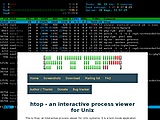 This is htop, an interactive process viewer for Unix systems. It is a text-mode application (for console or X terminals) and requires ncurses.
This is htop, an interactive process viewer for Unix systems. It is a text-mode application (for console or X terminals) and requires ncurses.
 FAI is a non-interactive system to install and configure Linux systems and software packages on computers as well as virtual machines, from small networks to large-scale infrastructures like clusters and virtual environments. It can be used for creating custom disk images used in virtual machines or on a cloud-computing platform. There's also a web build service for customized installation and cloud images.
FAI is a non-interactive system to install and configure Linux systems and software packages on computers as well as virtual machines, from small networks to large-scale infrastructures like clusters and virtual environments. It can be used for creating custom disk images used in virtual machines or on a cloud-computing platform. There's also a web build service for customized installation and cloud images.
 Anweddol is a open-source client/server system providing temporary, SSH-controllable virtual machines to enhance anonymity online. It’s usefulness comes when someone wants to use a fully functional computer while being exposed to less dangers by using it remotely on a dedicated server, and by destroying it after use. The project includes the client and server implementation. Check out the website for more : https://the-anweddol-project.github.io/
Anweddol is a open-source client/server system providing temporary, SSH-controllable virtual machines to enhance anonymity online. It’s usefulness comes when someone wants to use a fully functional computer while being exposed to less dangers by using it remotely on a dedicated server, and by destroying it after use. The project includes the client and server implementation. Check out the website for more : https://the-anweddol-project.github.io/
 rawhide - find files using pretty C expressions. Rawhide (rh) lets you search for files on the command line using expressions and user-defined functions in a mini-language inspired by C. It's like find(1), but more fun to use. Search criteria can be very readable and self-explanatory and/or very concise and typeable, and you can create your own lexicon of search terms. The output can include lots of detail, like ls(1).
rawhide - find files using pretty C expressions. Rawhide (rh) lets you search for files on the command line using expressions and user-defined functions in a mini-language inspired by C. It's like find(1), but more fun to use. Search criteria can be very readable and self-explanatory and/or very concise and typeable, and you can create your own lexicon of search terms. The output can include lots of detail, like ls(1).
 sshdo - controls which commands may be executed via incoming ssh. sshdo provides an easily configurable way of controlling which commands may be executed via incoming ssh connections by specific users and specific keys. Training mode allows a key to be used for any command, while logging them. Then sshdo can learn from the logs to know what commands to allow. It can also unlearn commands that are no longer in use. This mitigates against private ssh key compromise with very little effort.
sshdo - controls which commands may be executed via incoming ssh. sshdo provides an easily configurable way of controlling which commands may be executed via incoming ssh connections by specific users and specific keys. Training mode allows a key to be used for any command, while logging them. Then sshdo can learn from the logs to know what commands to allow. It can also unlearn commands that are no longer in use. This mitigates against private ssh key compromise with very little effort.
 This tool provides a basic, RFC-compliant LDAP server to serve locally-defined user and groups (i.e. in /etc/passwd and /etc/group). By using directoryd, one can turn a vanilla UNIX/Linux server into a central identity repository for other UNIX/Linux servers, macOS machines, ownCloud/Nextcloud, Gitea, Zabbix, nearly any LDAP-aware solution...
This tool provides a basic, RFC-compliant LDAP server to serve locally-defined user and groups (i.e. in /etc/passwd and /etc/group). By using directoryd, one can turn a vanilla UNIX/Linux server into a central identity repository for other UNIX/Linux servers, macOS machines, ownCloud/Nextcloud, Gitea, Zabbix, nearly any LDAP-aware solution...
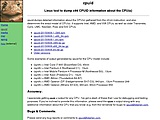 cpuid dumps detailed information about the CPU(s) gathered from the CPUID instruction, and also determines the exact model of CPU(s) from that information.
cpuid dumps detailed information about the CPU(s) gathered from the CPUID instruction, and also determines the exact model of CPU(s) from that information.
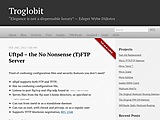 uftpd is a small FTP/TFTP server. No configuration files, no hassle, it just works!
uftpd is a small FTP/TFTP server. No configuration files, no hassle, it just works!
 Replacement for old libnss-mysql as naming service library in Linux. You can store user information in MariaDB/MySQL database. E.g. `ls` then automatically shows user name from the database, `getent` shows users and groups. ## Features - implements `password`, `shadow` and `group` getters - `cmake` build system - `libconfig` for configuration - uses direct queries and `real_escape_string` - uses `threads.c` from `C11` - requirements: `Glibc 2.28`, `GCC 8`, equivalent of `Debian 10` (*Buster*)
Replacement for old libnss-mysql as naming service library in Linux. You can store user information in MariaDB/MySQL database. E.g. `ls` then automatically shows user name from the database, `getent` shows users and groups. ## Features - implements `password`, `shadow` and `group` getters - `cmake` build system - `libconfig` for configuration - uses direct queries and `real_escape_string` - uses `threads.c` from `C11` - requirements: `Glibc 2.28`, `GCC 8`, equivalent of `Debian 10` (*Buster*)
 Designed to perform security audits against websites that have been made available without SSL enabled.
Designed to perform security audits against websites that have been made available without SSL enabled.
 The Apache mod_rrd module provides a set of filters and handlers to manipulate and display RRD graphs.
The Apache mod_rrd module provides a set of filters and handlers to manipulate and display RRD graphs.
 Tarmux attempts to solve the problem of handling streamed data where there is insufficient temporary space on disk to hold the data, as is forced by tar. In the simplest invocation, tarmux takes a stream from stdin, and creates a tar file consisting of sequential numbered file fragments one after the other. This can be reversed by the tardemux tool, which will untar the fragments and reassemble the stream to stdout. The tardemux tool only reads a single tar stream before exiting. This allows m
Tarmux attempts to solve the problem of handling streamed data where there is insufficient temporary space on disk to hold the data, as is forced by tar. In the simplest invocation, tarmux takes a stream from stdin, and creates a tar file consisting of sequential numbered file fragments one after the other. This can be reversed by the tardemux tool, which will untar the fragments and reassemble the stream to stdout. The tardemux tool only reads a single tar stream before exiting. This allows m
 Retry a command until the command succeeds. Retry captures stdin into memory as the data is passed to the repeated command, and this captured stdin is then replayed should the command be repeated. This makes it possible to embed the retry tool into shell pipelines. Retry captures stdout into memory, and if the command was successful stdout is passed on to stdout as normal, while if the command was repeated stdout is passed to stderr instead. This ensures that output is passed to stdout once an
Retry a command until the command succeeds. Retry captures stdin into memory as the data is passed to the repeated command, and this captured stdin is then replayed should the command be repeated. This makes it possible to embed the retry tool into shell pipelines. Retry captures stdout into memory, and if the command was successful stdout is passed on to stdout as normal, while if the command was repeated stdout is passed to stderr instead. This ensures that output is passed to stdout once an
 Reseter.css is a CSS reset and normalizer. Reseter.css resets all the premade styles by the browser. Normalizes the browser's stylesheet. Removes most browser i
Reseter.css is a CSS reset and normalizer. Reseter.css resets all the premade styles by the browser. Normalizes the browser's stylesheet. Removes most browser i
 A command-line network packet crafting and injection utility for UNIX, Linux, and Windows.
A command-line network packet crafting and injection utility for UNIX, Linux, and Windows.
 mlbfilt can remove one or more multi-line text blocks from the output of a command or file. It can be conveniently used as an error filter. mlbfilt is geared towards usage within interactive shell sessions by handling colorized output sensibly, flushing as soon as possible and being able to handle multiple large patterns efficiently.
mlbfilt can remove one or more multi-line text blocks from the output of a command or file. It can be conveniently used as an error filter. mlbfilt is geared towards usage within interactive shell sessions by handling colorized output sensibly, flushing as soon as possible and being able to handle multiple large patterns efficiently.
 rduty is a Python script to easily and quickly run a command or multiple commands on remote and local hosts and devices via ssh (telnet is also supported). It is also able to automate repetitive tasks on many hosts using inventory files from Ansible, or simple .ini inventory files. rduty is currently tested on Python3, it hasn't been tested yet on other Python versions.
rduty is a Python script to easily and quickly run a command or multiple commands on remote and local hosts and devices via ssh (telnet is also supported). It is also able to automate repetitive tasks on many hosts using inventory files from Ansible, or simple .ini inventory files. rduty is currently tested on Python3, it hasn't been tested yet on other Python versions.
 A convenient interface to execute shell-commands or browse the filesystem on your remote web server. Similar to a telnet or SSH connection. Use it for administration and maintenance of your web site using commands like ps, cat, gunzip, and more.
A convenient interface to execute shell-commands or browse the filesystem on your remote web server. Similar to a telnet or SSH connection. Use it for administration and maintenance of your web site using commands like ps, cat, gunzip, and more.
 A simple tc command wrapper tool. Easy to setup traffic control of network bandwidth/latency/packet-loss/packet-corruption to network interfaces.
A simple tc command wrapper tool. Easy to setup traffic control of network bandwidth/latency/packet-loss/packet-corruption to network interfaces.
 This utility has been written for two purposes: for making high availability clusters; for making backups of them. Consider it a better and faster lsyncd written in C.
This utility has been written for two purposes: for making high availability clusters; for making backups of them. Consider it a better and faster lsyncd written in C.
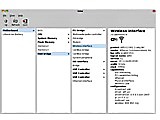 lshw (HardWare LiSter) is a small tool for Linux to provide detailed information on the hardware configuration of the machine. It can report exact memory configuration, firmware version, mainboard configuration, CPU version and speed, cache configuration, bus speed, etc.
lshw (HardWare LiSter) is a small tool for Linux to provide detailed information on the hardware configuration of the machine. It can report exact memory configuration, firmware version, mainboard configuration, CPU version and speed, cache configuration, bus speed, etc.
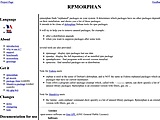 rpmorphan finds "orphaned" RPM packages on your system (packages which have no other packages depending on their installation). Console and graphical interfaces are provided. It is clone of the deborphan Debian program, but for RPM packages. It also provides some others RPM tools: rpmusage, rpmdep, and rpmduplicates.
rpmorphan finds "orphaned" RPM packages on your system (packages which have no other packages depending on their installation). Console and graphical interfaces are provided. It is clone of the deborphan Debian program, but for RPM packages. It also provides some others RPM tools: rpmusage, rpmdep, and rpmduplicates.
 Harvest is a compact, fast and portable software that can scan files and folders to recognise their typology. Scanning is based on file extensions and a simple fuzzy logic analysis of folder contents to recognise if they are related to video, audio or text materials. Harvest makes it easy to list folders by type or year, to move them or to categorize them for tagged filesystems. It can process approximately 1GB of stored files per second and is operated from the console terminal. Harvest is de
Harvest is a compact, fast and portable software that can scan files and folders to recognise their typology. Scanning is based on file extensions and a simple fuzzy logic analysis of folder contents to recognise if they are related to video, audio or text materials. Harvest makes it easy to list folders by type or year, to move them or to categorize them for tagged filesystems. It can process approximately 1GB of stored files per second and is operated from the console terminal. Harvest is de
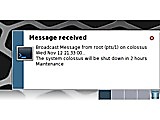 The xwrited utility displays write(1) and wall(1) messages as desktop notifications. A notification daemon compliant to the freedesktop.org Desktop Notification Specification draft needs to be running in order to display the notifications.
The xwrited utility displays write(1) and wall(1) messages as desktop notifications. A notification daemon compliant to the freedesktop.org Desktop Notification Specification draft needs to be running in order to display the notifications.
 Stresslinux is a minimal linux distribution running from a bootable cdrom, usb, vmware or via PXE. Stresslinux makes use of some utitlities available on the net like: stress, cpuburn, hddtemp, lm_sensors ... Stresslinux is dedicated to users who want to test their system(s) entirely on high load and monitoring the health.
Stresslinux is a minimal linux distribution running from a bootable cdrom, usb, vmware or via PXE. Stresslinux makes use of some utitlities available on the net like: stress, cpuburn, hddtemp, lm_sensors ... Stresslinux is dedicated to users who want to test their system(s) entirely on high load and monitoring the health.
 Shuriken is a tool to facilitate the tedious task of copying config files and ssh keys across servers; to do so it follows a very minimalist approach, leveraging the power of script generation directly in the clipboard and ready to paste in a terminal, rather than dealing with file transfers and file permissions. When a file is imported from stdin, Shuriken detects what it is and imports it into its repository (usually in `~/.shuriken`) where all public keys and configurations are stored. When
Shuriken is a tool to facilitate the tedious task of copying config files and ssh keys across servers; to do so it follows a very minimalist approach, leveraging the power of script generation directly in the clipboard and ready to paste in a terminal, rather than dealing with file transfers and file permissions. When a file is imported from stdin, Shuriken detects what it is and imports it into its repository (usually in `~/.shuriken`) where all public keys and configurations are stored. When
 top-like cli interface for container monitoring
top-like cli interface for container monitoring
 Launch commands, one drop at time. The purpose of OcLaunch is to easily launch command one by one. Since it's a command-line tool, you can use it almost everything, from GUI to CRON task. What is it? OcLaunch: Command-line program allowing you to launch program on a human basis. Don't let a clock plan things! For example, here is a typical session (you open a terminal emulator between each item): You open your first terminal, your chat client is opened, On second launch of a termina
Launch commands, one drop at time. The purpose of OcLaunch is to easily launch command one by one. Since it's a command-line tool, you can use it almost everything, from GUI to CRON task. What is it? OcLaunch: Command-line program allowing you to launch program on a human basis. Don't let a clock plan things! For example, here is a typical session (you open a terminal emulator between each item): You open your first terminal, your chat client is opened, On second launch of a termina
 sup is a very small and secure C application. it is designed to run as root (with suid bit on) to facilitate the privilege escalation of users to execute certain programs as superuser. all settings in sup are hard-coded at compile time. sup is very portable and self-contained, designed for production use as a static binary. sup is a sort of hard-coded sudo: it is an ideal companion for artisans building small containers and embedded systems.
sup is a very small and secure C application. it is designed to run as root (with suid bit on) to facilitate the privilege escalation of users to execute certain programs as superuser. all settings in sup are hard-coded at compile time. sup is very portable and self-contained, designed for production use as a static binary. sup is a sort of hard-coded sudo: it is an ideal companion for artisans building small containers and embedded systems.
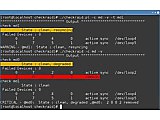 checkraid is a script that uses OEM tools to check the status of RAID arrays. It can be used standalone, with snmpd or nagios nrpe. The script is nagios/icinga compatible. It currently works with Adaptec (arcconf), 3ware (tw_cli), zfs (zpool), and md (mdadm).
checkraid is a script that uses OEM tools to check the status of RAID arrays. It can be used standalone, with snmpd or nagios nrpe. The script is nagios/icinga compatible. It currently works with Adaptec (arcconf), 3ware (tw_cli), zfs (zpool), and md (mdadm).
 A utility to read the contents of the Postfix mail queue and filter according to arguments provided. Loosely based on the command exiqgrep which provides similar functionality for the exim mail server.
A utility to read the contents of the Postfix mail queue and filter according to arguments provided. Loosely based on the command exiqgrep which provides similar functionality for the exim mail server.
 ppip is a reimplementation of the venerable CP/M utility PIP - Peripheral Interchange Program
ppip is a reimplementation of the venerable CP/M utility PIP - Peripheral Interchange Program
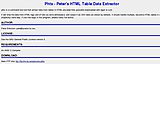 A small Unix command line tool that can be used to extract data from tables in a HTML-encoded text file. Outputs the (stripped from other HTML tags and (possible whitespace) data as a CSV-formatted file/on stdout. Should handle recursive tables and the most common incorrect HTML errors (missing
A small Unix command line tool that can be used to extract data from tables in a HTML-encoded text file. Outputs the (stripped from other HTML tags and (possible whitespace) data as a CSV-formatted file/on stdout. Should handle recursive tables and the most common incorrect HTML errors (missing | , or
tags.